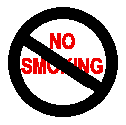 According to a new study published in the September, 2009 issue of the Journal of the American College of Cardiology, the risk of heart attacks was reduced, as a result of smoking bans in public areas. This was noted particularly among younger individuals as well as nonsmokers and is reducing the number of heart attacks by as much as 26% each year.
According to a new study published in the September, 2009 issue of the Journal of the American College of Cardiology, the risk of heart attacks was reduced, as a result of smoking bans in public areas. This was noted particularly among younger individuals as well as nonsmokers and is reducing the number of heart attacks by as much as 26% each year.
According to Dr. David Meyers, Professor of Cardiology and Preventive Medicine at the University of Kansas School of Medicine, ‘even breathing in low doses of cigarette smoke can increase the risk of heart attacks’. Dr. Meyers is the lead investigator of the most comprehensive study done to date on smoking issues. Dr. Meyers also stated that ‘public smoking bans might also help prevent lung cancer and emphysema’.
A nationwide ban on public smoking could prevent as many as 154,000 heart attacks each year according to authorities. The evidence simply confirms that second-hand smoke exposure is nearly as harmful to the heart as chronic active smoking. It is known that direct smoking doubles the risk of heart attacks and second-hand smoke increases the risk by 30 percent.
The public smoking bans has had a stronger influence in reducing heart attacks among women and younger individuals. This is probably because younger people tend to visit clubs, restaurants and bars where smoking is usually part of the social scene.
Health officials note that smoking still remains the most preventable risk factor for heart attacks. Second-hand smoke is thought to increase the probability of a heart attack by making the blood ‘sticky’ and more prone to clotting. This reduces the amount of good (HDL) cholesterol in the body, and puts individuals at greater risk for other heart problems.
The benefits of smoking bans can appear to be fairly immediate, which is the good news! Declines in heart attack cases have been reported within 3 months. The impact of smoking bans has been strengthened, if compliance was good, and baseline smoking prevalence was low along with good air quality.
So far, public and workplace smoking bans has been enforced in 32 states and many cities across the country. The medical community encourages everyone to support community smoking bans and other tobacco control measures which includes tax increases on cigarettes, expanded smoking cessation services and educational campaigns.
As the United States increases polices to protect nonsmokers from second-hand smoke, efforts for better health will be benefited in reduction of chronic diseases, disabilities and death.
If you wish to quit smoking or want to help someone else quit, order TobacPak. This is a guaranteed solution for nicotine addiction.
0 responses so far ↓
There are no comments yet...Kick things off by filling out the form below.
Leave a Comment